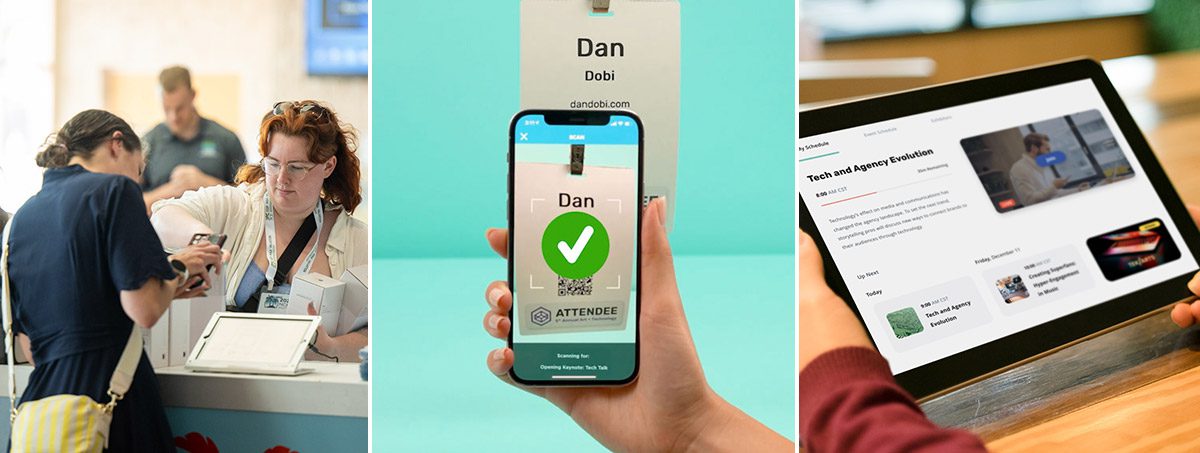In This Article
Here’s what you’ll learn in The Ultimate Guide to Event Tech (2025): Must-Have Tools for Organizers:
- What event technology is (and why it matters): A beginner-friendly breakdown of event tech and how the right solutions streamline planning and improve the attendee experience.
- 7 must-have event technology tools in 2025: From on-site badge printing and event management software to mobile apps and lead capture, discover the essentials every organizer needs.
- How to choose the right event tech solution: Key features to look for in platforms and integrations that make event management smarter, more seamless, and more successful.
The Ultimate Guide to Event Tech Part 1: Must-Have Tools for Organizers (2025)

Example: Expo Pass offers a powerful all-in-one event technology solution, including tools for seamless registration, on-site badge printing & check-in, lead capture, virtual / hybrid events, and mobile event app.
Event planners know… this business is complicated, whether you’re running a 200-person seminar or a sprawling expo with thousands of attendees, you’re juggling countless moving parts, from registration lists, to signage, AV, catering, sponsors, speakers, check-in desks, and more. And while attendees don’t see the chaos behind the scenes, they definitely notice if things go wrong.
But fear not, event technology is here to help! Gone are the days of old-school spreadsheet wrangling, juggling vendor rolodexes, and relying on late-night email chains to keep it all together. Event technology is the invisible thread that can help you string it all together without the headaches and hassle. It’s the behind-the-scenes system doing the heavy lifting, automating tasks, syncing data, and organizing the chaos so planners can focus on creating experiences instead of putting out fires. Sounds great, right? Well, let’s take a step back and try and figure out what it all really means for you.
In this guide, we’ll cover all things “event tech,” and what the practical, useful, and essential tools are that every event planner should know.
What Is Event Technology?
Think of event technology (or event tech) as a set of digital tools designed to make planning and running events easier. It’s the behind-the-scenes support that helps keep everything organized, smooth, and hassle-free.
For many planners, this comes in the form of an all-in-one event management platform — like a Swiss Army knife of event software and hardware: one solution with multiple tools built in. Instead of juggling separate systems for registration, check-in, mobile apps, and reporting, everything works together in one place. There are also individual event tech tools for specific tasks: Maybe you just need a mobile event app, or want to add on-site badge printing to your event, but you’ve already got a system in place to handle the other pieces.
As we dive deeper into different examples of event technology and how they work for real event planners, keep in mind that these tools are designed to make your job easier, not create extra headaches. So whether and how they fit into your process will vary depending on your unique conference or event.
The Benefits of Event Tech
At its core, event tech makes planning smarter, faster, and less stressful. Instead of juggling dozens of moving parts manually, planners get tools that automate and connect the dots across every stage of the event. That means fewer headaches behind the scenes and a smoother, more professional experience for attendees.
Here are some of the biggest benefits of using event technology in 2025:
✅ Streamlined Planning:
From registration to reporting, event tech ties your workflows together so you spend less time tracking details and more time focusing on the big picture.
✅ Smarter Decision-Making:
With real-time data flowing in, planners know exactly what’s happening across their event. Attendance numbers, session tracking, and feedback tools provide insights that help you adjust on the fly and improve for next time.
✅ Better Attendee Experience:
Guests notice when things feel easy. Quick check-ins, accurate badges, personalized agendas, and interactive features all add up to an event that feels professional and engaging from the moment they arrive.
✅ Time and Cost Savings:
Automation means fewer staff hours spent on manual tasks and fewer wasted resources. Over time, those savings free up budget and bandwidth for the parts of your event that really move the needle.
✅ Proven ROI:
Deliver real numbers, not just hunches. With built-in analytics, event tech helps you track how your event delivered value, from qualified lead capture, to session attendance, to sponsor impressions.
In short, event tech doesn’t just help you run your events, it helps you run them smarter, smoother, and with a better overall experience for attendees.
Examples of Event Technology: Check-in and on-demand badge printing at NCEO Annual Summit 2025 (Photo by David Rainey); QR code scanning for lead capture and session tracking; Virtual & hybrid event platforms (photos by Expo Pass)
Must-Have Event Tech Tools in 2025
So what does event tech actually look like in practice? Here are the essential event technology tools shaping successful conferences today:
1. Registration & Ticketing

Every attendee journey begins long before they walk into the venue. Event technology for registration and ticketing creates that very first touchpoint, turning what used to be paper forms or clunky spreadsheets into a seamless digital experience. A good registration platform handles branded sign-ups, payments, confirmations, and data collection, while integrating smoothly with your CRM and check-in system.
Why it matters:
- Sets a professional tone with branded sign-up pages.
- Reduces friction with secure payments and instant confirmations.
- Collects the right attendee data for personalization.
💡 Pro Tip: Make sure your registration platform delivers mobile-friendly forms so your sign-up process is simple and seamless for everyone. Bonus points if your registration tech allows you to collect custom information during the process, from meal-preferences to travel info.
2. On-Site Check-In & On-Demand Badge Printing
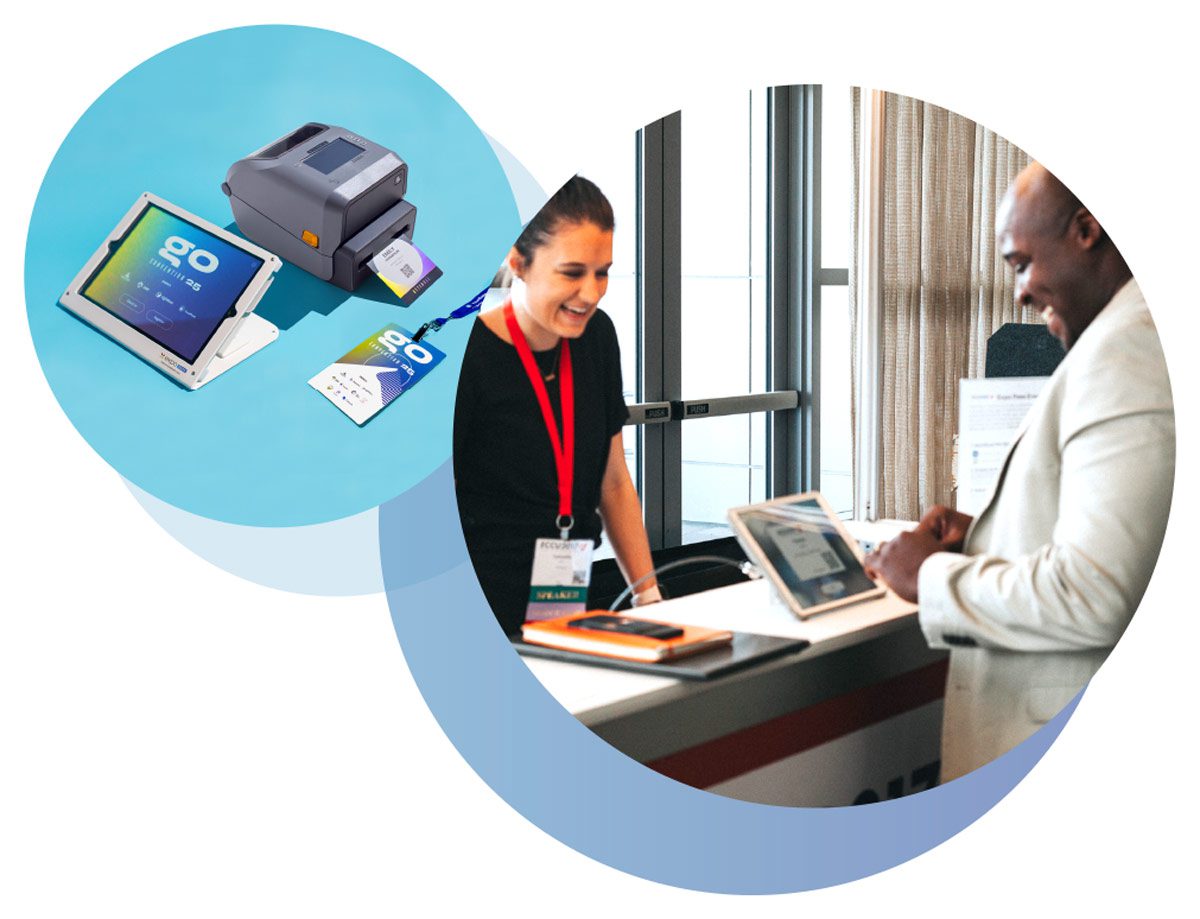 Once attendees arrive, the spotlight shifts to the check-in experience. Long lines and missing badges are the fastest way to sour first impressions. Event check-in paired with on-site badge printing has become one of the most essential event tech tools in an organizer’s toolbelt — letting attendees check-in quickly or scan a QR code to print a professional badge in seconds.
Once attendees arrive, the spotlight shifts to the check-in experience. Long lines and missing badges are the fastest way to sour first impressions. Event check-in paired with on-site badge printing has become one of the most essential event tech tools in an organizer’s toolbelt — letting attendees check-in quickly or scan a QR code to print a professional badge in seconds.
Why it matters:
- Good on-site check-in tech keeps lines moving quickly.
- On-site badges and check-in can provide flexibility for walk-ins, late registrations, and last-minute info changes / edits.
- On-demand event badge printing cuts down on waste from unused pre-printed badges.
🤩 Example: The best event technology solutions, like Expo Pass, offer plug-and-play badge printing kits that come with everything you need for on-site event badging and check-in, and syncs seamlessly with your registration tech.
3. Mobile Event Apps
 These days, attendees want access to all your event info and materials without lugging around a folder of printouts. Mobile event apps put the entire event in their pocket, serving as a digital companion that helps them make the most of their time on-site. Schedules, exhibitor lists, networking tools, and live updates are now expected by attendees, not just “nice-to-haves.”
These days, attendees want access to all your event info and materials without lugging around a folder of printouts. Mobile event apps put the entire event in their pocket, serving as a digital companion that helps them make the most of their time on-site. Schedules, exhibitor lists, networking tools, and live updates are now expected by attendees, not just “nice-to-haves.”
Why it matters:
- Gives attendees access to key materials and info at all times.
- Allows for real-time updates, personalized agendas, and networking opportunities.
- Can add interactive elements, integrated feedback tools, and engagement.
💡 Pro Tip: Some event technology providers, like Expo Pass, give you tools to customize your event app for pre-event, during-event, and post-event modes — ensuring your attendees have access to relevant info and materials when they need it.
4. Lead Capture & Exhibitor Tools
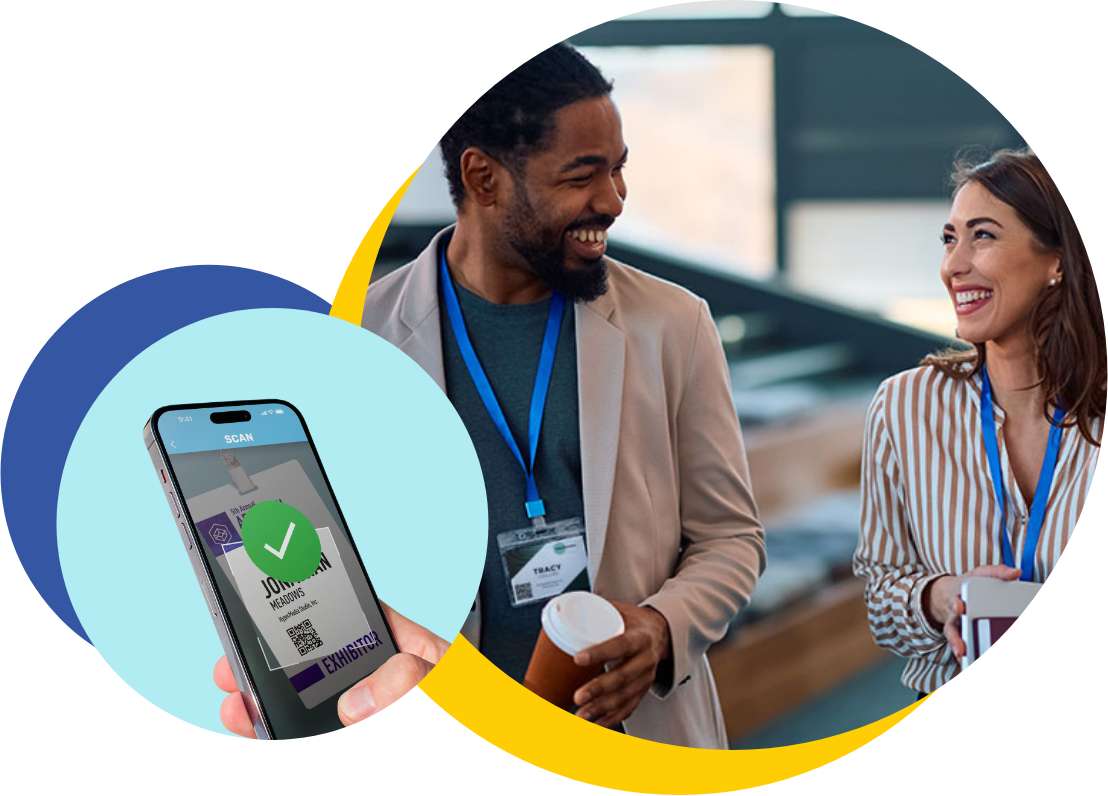 For exhibitors and sponsors, event tech is the difference between collecting a stack of business cards and walking away with a CRM full of qualified leads. Modern lead capture tools allow exhibitors to scan badges, record notes, and sync everything instantly, making ROI and follow-up faster than ever.
For exhibitors and sponsors, event tech is the difference between collecting a stack of business cards and walking away with a CRM full of qualified leads. Modern lead capture tools allow exhibitors to scan badges, record notes, and sync everything instantly, making ROI and follow-up faster than ever.
Why it matters:
- Captures leads instantly and accurately.
- Simplifies follow-up with custom notes and tags.
- Provides organizers with insights into booth traffic.
💡 Pro Tip: Look for lead capture tech that doesn’t rely on third party or proprietary scanning devices and software that can be finicky, outdated, or rigid. The best solutions allow exhibitors to simply use their own devices (iOS or Android) for lead retrieval scans, and are offline-ready so they continue to work even if your wifi goes down.
5. Virtual & Hybrid Platforms
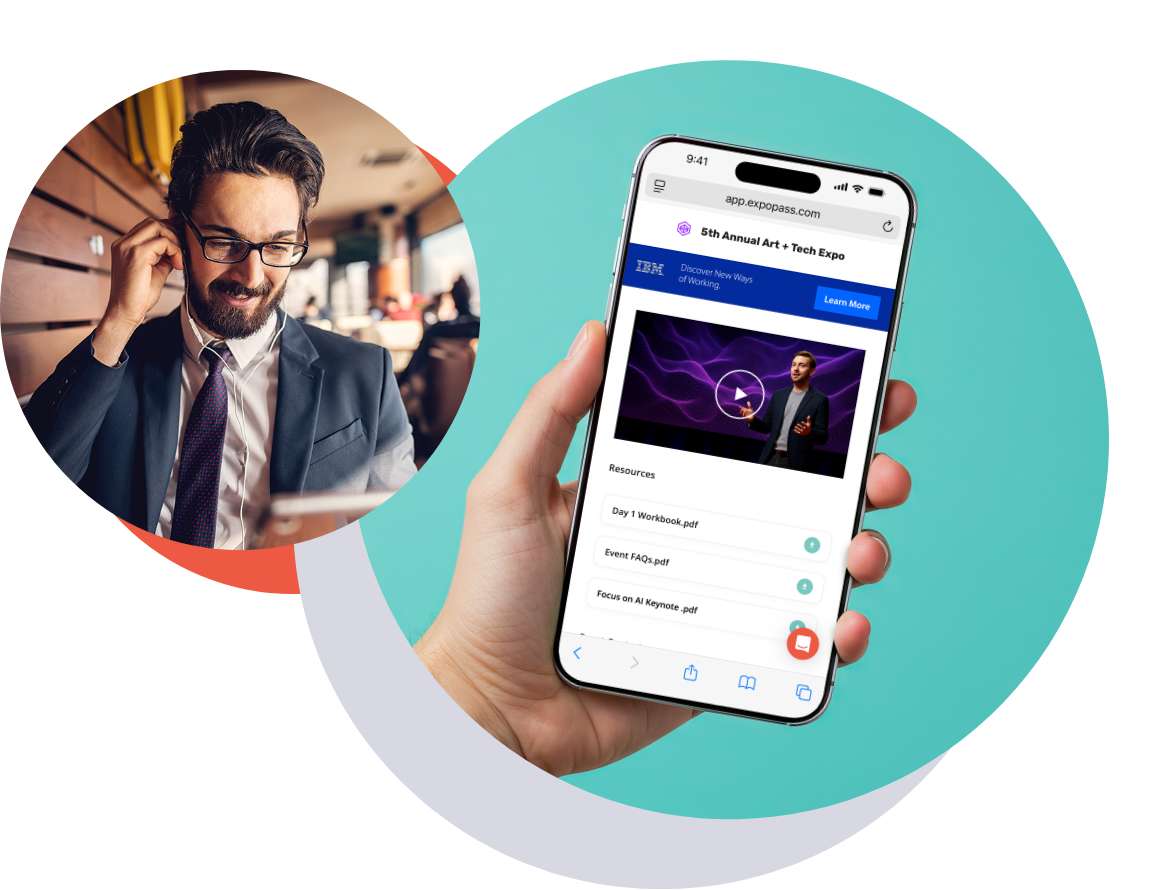 During COVID, the event industry saw a fast shift toward virtual conference and remote accessibility. But with in-person gatherings back in full-swing, the need for virtual formats hasn’t gone away — it’s evolved. Virtual and hybrid event platforms expand your reach across the globe, boost inclusivity, and open new revenue streams. And the best event technology doesn’t just stream sessions, it builds interactive, two-way experiences that keep remote attendees just as engaged as those on-site.
During COVID, the event industry saw a fast shift toward virtual conference and remote accessibility. But with in-person gatherings back in full-swing, the need for virtual formats hasn’t gone away — it’s evolved. Virtual and hybrid event platforms expand your reach across the globe, boost inclusivity, and open new revenue streams. And the best event technology doesn’t just stream sessions, it builds interactive, two-way experiences that keep remote attendees just as engaged as those on-site.
Why it matters:
- Expands your event’s reach to remote audiences.
- Offers new revenue streams with virtual ticket tiers.
- Provides unified reporting across in-person and online audiences.
💡 Pro Tip: Don’t just stream content, design hybrid experiences with interaction points like live Q&A and online session feedback, so remote attendees feel just as engaged as those in the room.
6. Feedback & Engagement Tools
Engagement doesn’t end with applause at the end of a session. Modern event tech gives planners opportunities to connect with attendees in ways that weren’t possible before. From live polling and instant session ratings to custom surveys built right into your app, these tools let you capture valuable feedback throughout the attendee journey. They don’t just make events more interactive in the moment, they create a feedback loop that improves your event year after year.
Why it matters:
- Keeps attendees actively engaged and invested.
- Creates two-way interaction rather than one-way lectures.
- Provides actionable insights for future planning.
🙋 Example: Try incentivizing post-session feedback or running a social share campaign tied to your event app. A free giveaway or prize drawing is easy to implement and can significantly boost response rates and drive engagement, both during the event and after it’s wrapped.
7. Analytics & Reporting
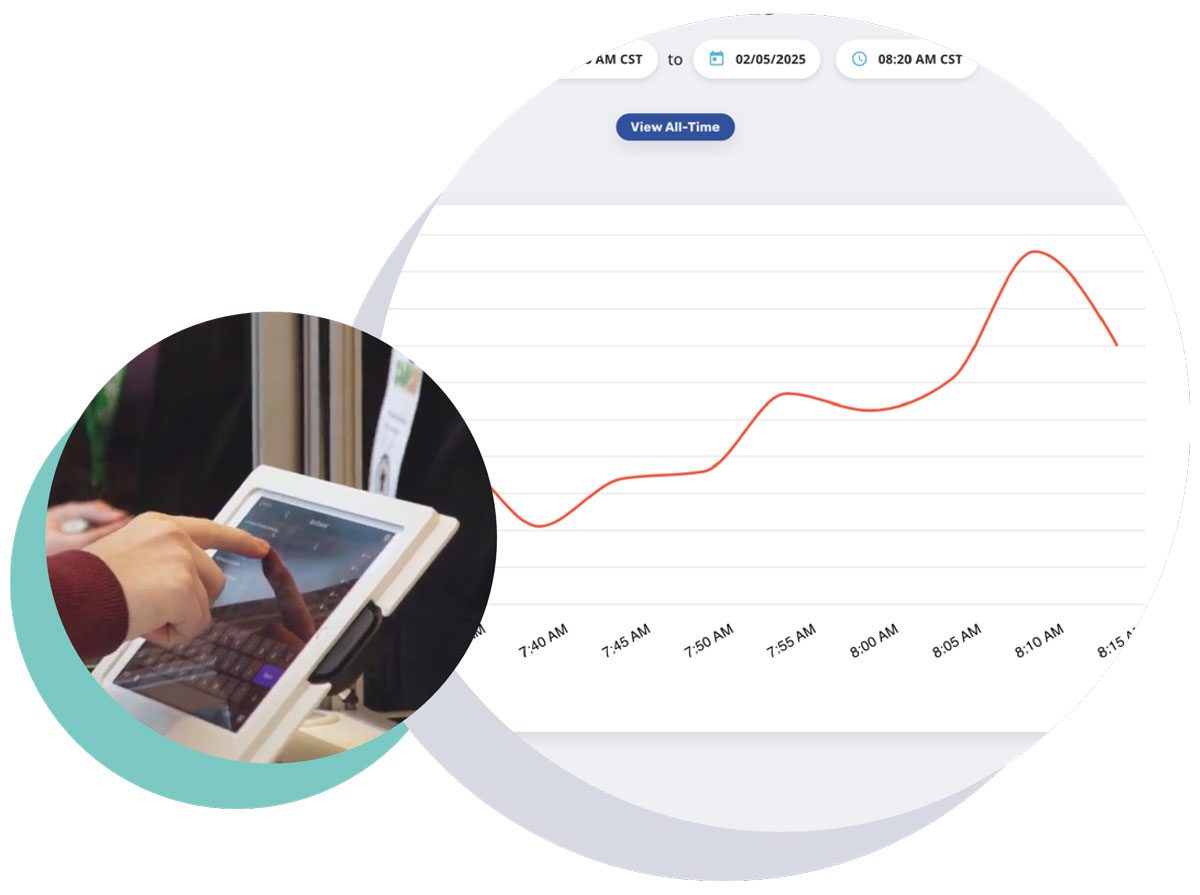 Behind the scenes, data is where event technology truly shines. From registrations and survey results, to gathering accurate session attendance in/out times, analytics turn countless moving parts into actionable insights. For planners, the data and reporting is how to show that the juice of all that hard work was worth the squeeze.
Behind the scenes, data is where event technology truly shines. From registrations and survey results, to gathering accurate session attendance in/out times, analytics turn countless moving parts into actionable insights. For planners, the data and reporting is how to show that the juice of all that hard work was worth the squeeze.
Why it matters:
- Shows stakeholders hard numbers on event impact.
- Reveals which sessions or activities had the most value.
- Informs smarter planning for the future.
💡 Pro Tip: Look beyond attendance numbers! Gather custom data when possible, with booth scans and survey feedback that can provide richer insights into event success.
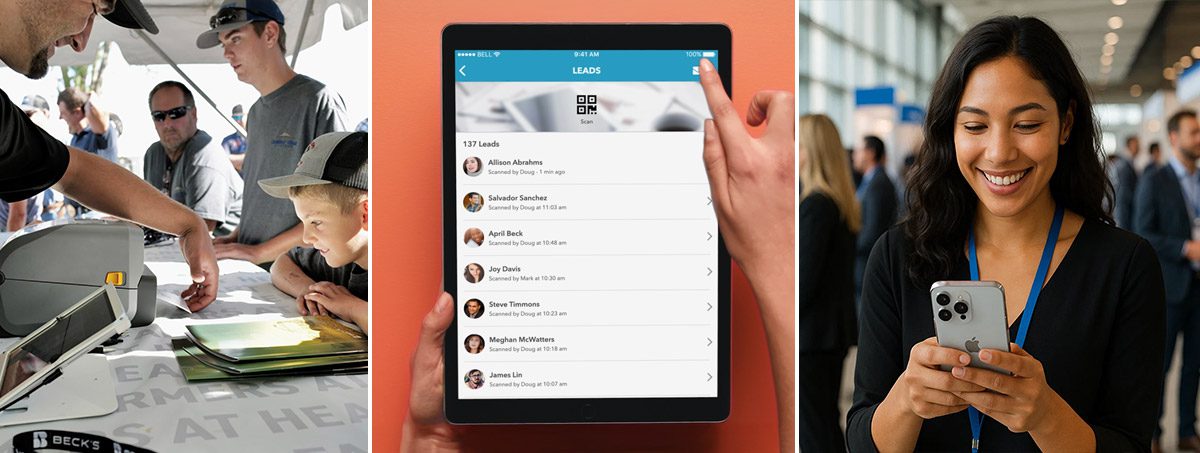
Examples of Event Technology: On-site registration & on-demand badge printing at Becknology Days™ (Photo by Becks); Lead capture & advanced reporting; Mobile event app (photos by Expo Pass)
Choosing the Right Event Tech Solution
With so many tools on the market, how do you know which event technology solution is right for your event? The answer depends on your goals, your team, and the type of experience you want to deliver.
Here are a few things to look for when evaluating solutions:
✅ Ease of Use:
The best platforms don’t require a tech degree. Look for intuitive tools, clean workflows, and minimal training required.
✅ Seamless Integration:
Whether it’s your CRM, email marketing system, or existing signup flow, your event tech should play nicely with the tools you already use.
✅ Scalability:
Your event tech should work just as well for a 100-person meeting as it does for a 10,000+ attendee expo.
✅ Flexibility:
Consider whether you need an all-in-one event management solution or a collection of individual tools that can be mixed and matched.
✅ Support & Service:
Even the most intuitive platforms benefit from reliable support. Check whether providers offer in-house customer service, training resources, or live event-day assistance.
✅ Data & Reporting:
Choose solutions that make it easy to measure success, because data isn’t just nice to have, it’s what you need to secure budgets and improve year after year.
🤓 Remember: It’s a lot to take in when you’re getting started, but try not to let it overwhelm you! Event tech is here to make your planning life easier, save you time, and create a smoother experience for your attendees.
FAQs About Event Technology
What is event technology?
Event technology (or “event tech”) is the set of digital tools and software used to plan, manage, and run events. From online registration to on-site badge printing and mobile event apps, it helps organizers streamline logistics, improve attendee experiences, and measure success.
Do small events really need event technology?
Yes! Even small events benefit from tech, whether it’s making check-in faster, sending automated confirmations, or tracking attendance. It doesn’t have to be complicated or expensive, and the right tools will actually save you time.
Should I choose an all-in-one event management software or individual tools?
It depends on your needs. An all-in-one solution is like a Swiss army knife — everything you need in one place. If you already have some systems in place, there are individual tools that can integrate seamlessly with what you use to tackle the missing pieces.
How do I measure the ROI of event tech?
Most event technology solutions include reporting dashboards that track registrations, attendance, engagement, and leads captured. These metrics help you prove the value of your event to stakeholders and sponsors. But the ROI on the event tech itself comes down to saving you (and your team) time and headaches, from pre-event registration through post-event analytics.
Is on-demand badge printing worth it?
Absolutely. On-demand (or “on-site”) badge printing not only creates a smoother check-in experience, but also reduces waste from pre-printed badges and gives you flexibility for last-minute registrations and info changes, delivering professionalism and polish.
Wrapping It Up: Event Tech as Your Behind-the-Scenes Hero
Event technology isn’t just a line item in your budget, it’s the invisible engine powering modern events. From smarter planning and seamless check-ins, to meaningful data and proven ROI, event tech is what helps organizers do more with less, while elevating the attendee experience.
Whether you’re embracing an all-in-one event management software or carefully selecting best-in-class tools, the goal is the same: to make planning easier, execution smoother, and outcomes stronger.
Looking ahead, success in events won’t come from juggling endless spreadsheets and vendors, it will come from leveraging the right event tech to keep everything (and everyone) connected.
Next Up in the Series
👉 The Ultimate Guide to Event Tech (2025): Proven Trends vs. Tech Hype
Event tech evolves fast! Some trends can be real game-changers, while others are just noise. In our next guide, we’ll cut through the buzz and highlight the innovations that actually help planners deliver smarter, more seamless events.
